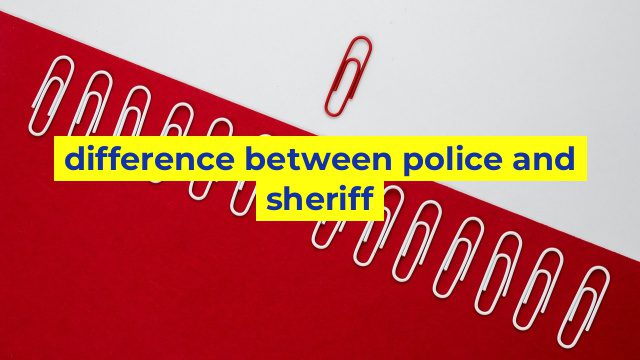The Differences Between Police and Sheriff
When it comes to law enforcement in the United States, there are two primary agencies- the police and the sheriff’s department. While the two agencies have similarities in their duties, there are significant differences in their roles and responsibilities. In this article, we will explore those differences and learn about the unique roles of each agency.
What is a Police Department?
Police departments are typically responsible for enforcing the law within a specific jurisdiction, such as a city or town. Police officers are employed by the municipality and are responsible for the safety and protection of the citizens in their area. The police department typically has a hierarchical structure, with officers reporting to lieutenants, captains, and chiefs.
Police departments have a wide range of responsibilities, which include responding to emergency calls, enforcing traffic laws, conducting criminal investigations, making arrests, and providing public safety functions such as fixing car locks, leash and tag for pets, and emergency first-aid services.
What is a Sheriff’s Department?
A Sheriff’s Department typically has jurisdiction over a county or an area larger than a city or town. The sheriff is an elected official and is responsible for the safety of the entire county. The sheriff’s department is a multi-functional organization that performs a variety of tasks, including enforcing the law, maintaining the county jail, serving legal documents, and providing security for the courts.
The sheriff’s department typically has a similar hierarchical structure to that of the police department, but the sheriff has more autonomy than a police chief. While police officers report to a chief who is hired by a city or town council, the sheriff is elected by the citizens of the county, giving them more control over the activities of the department.
The Differences Between Police and Sheriff’s Department
The primary difference between the two agencies is the scope of their jurisdiction. Police departments perform law enforcement duties within a municipality, while sheriff’s departments have jurisdiction over an entire county. This difference in jurisdiction often leads to the following differences:
- Size- Sheriff’s departments tend to have more officers and resources than police departments due to their larger jurisdiction.
- Duties- Sheriff’s departments have a broader range of responsibilities, including maintaining the county jail, serving legal documents, and providing security for the courts. Police departments primarily focus on enforcing the law, maintaining public safety, and conducting criminal investigations.
- Chain of Command- While both agencies have a hierarchical chain of command, the sheriff is elected and has more autonomy than a police chief, who is hired by a municipality.
- Salary- Sheriff’s department officers tend to earn more than police department officers due to their additional training and responsibilities.
Conclusion
Overall, police departments and sheriff’s departments have different roles and responsibilities, and the scope of jurisdiction plays a significant role in their differences. While police departments focus mainly on maintaining public safety within a municipality, sheriff’s departments have broader responsibilities that extend to the entire county. Understanding the differences between the police and the sheriff’s department can help individuals know who to contact during emergencies and who is responsible for maintaining public safety in their area.
Table difference between police and sheriff
| Police | Sheriff |
|---|---|
| Employed by city or municipality | Employed by county |
| Enforce state and local laws | Enforce state and county laws |
| Tend to work in urban areas | Tend to work in rural areas |
| Typically have a more specialized focus, such as traffic or criminal investigation units | Responsible for a wider range of duties, including court security and civil process service |
| Typically work in shifts | May work irregular hours and be on call 24/7 |

